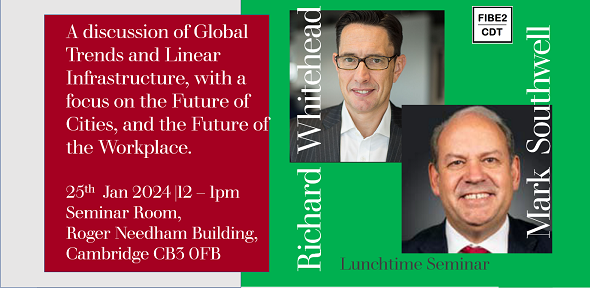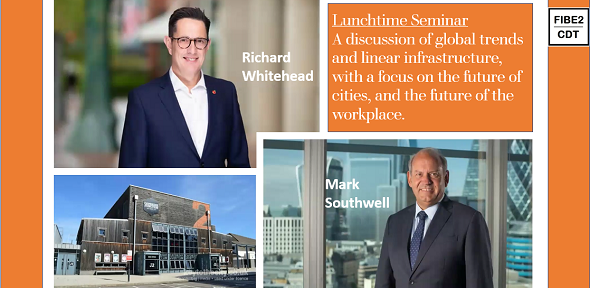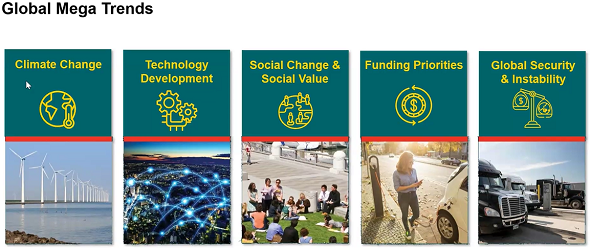
Submitted by Paula Block on Wed, 24/01/2024 - 17:13
Speaker 1 Bio: Richard Whitehead, Chief Executive - Global Buildings + Places. Richard is the Chief Executive of AECOM’s Buildings + Places global business line leading a talented team of over 10,000 professionals providing a diverse range of management, advisory, design and specialist technical services for major public and private sector clients around the world.
Richard began his career as a civil engineering with the UK-based AECOM legacy company, Bullen and Partners. He subsequently served in executive and leadership positions at major, multi-national engineering and design firms where he developed particular expertise in the delivery of major government and aviation programs. He then joined AECOM as Buildings + Places Managing Director in Europe.
With more than 30 years of industry experience and nearly a decade of service with AECOM, Richard is responsible for extending the Company’s global portfolio of iconic and award-winning buildings and landscapes through the delivery of sustainable planning, design and engineering services.
Additionally, Richard currently serves as a Chair of Perfect Circle, a joint venture company created to deliver the $1bn SCAPE Framework in the UK. He is also a board member of the Hertfordshire Local Enterprise Partnership and Chair of HertsIQ. In ten years the LEP has secured over $450M of Government funding to drive economic development across Hertfordshire, built over 5600 new homes and created 6020 new jobs. Richard was also recently elected to the board of Oaklands College in St Albans.
Speaker 2 Bio: Mark Southwell, Transportation Global Business Line Chief Executive. Mark Southwell is the Transportation Global Business Line Chief Executive at AECOM (NYSE:ACM), the world’s trusted infrastructure consulting firm delivering professional services throughout the project lifecycle – from advisory, planning, design and engineering to program and construction management.
In this role, Mark leads more than 14,000 professionals in AECOM’s global Transportation design business, which has been consistently ranked No. 1 by Engineering News-Record. The team delivers innovative solutions that advance its clients’ goals of delivering safe, sustainable, and cost-effective transportation systems. A renowned Civil Engineer with more than 35 years’ experience, Mark has deep expertise leading significant transportation infrastructure programs. He joined AECOM in 2019 as Managing Director of Civil Infrastructure for the company’s Europe region and later served as the Transportation Business Line Leader for Europe and India. Previously, he led Signalling Renewals for the Network Rail National Programme in the UK and CH2M’s European Transport Business (later acquired by Jacobs). At Jacobs, he served as Vice President, Rail and Geotechnical.
On projects spanning transportation, buildings, water, new energy, and the environment, AECOM’s public- and private-sector clients trust us to solve their most complex challenges. Our teams are driven by a common purpose to deliver a better world through our unrivalled technical and digital expertise, a culture of equity, diversity and inclusion, and a commitment to environmental, social and governance priorities. AECOM is a Fortune 500 firm and its Professional Services business had revenue of $13.1 billion in fiscal year 2022. See how we are delivering sustainable legacies for generations to come at aecom.com and @AECOM.
Talk Title: A discussion of global trends and linear infrastructure, with a focus on the future of cities, and the future of the workplace.
Abstract: Richard and Mark will cover 'Future Infrastructure and the Built Environment'. They will discuss global trends and markets for liner infrastructure, the future of cities and the future of work/workplace.
Talk Summary. Many thanks indeed to Aecom’s Richard Whitehead, Chief Executive - Global Buildings + Places and Mark Southwell, Transportation Global Business Line Chief Executive for delivering one of FIBE2's most interesting Lunchtime Seminars.
Richard brought it close to home when he mentioned building “The Junction” near the Cambridge Railway station. He was especially delighted that The Junction has become THE hotspot for the Cambridge live music and arts scene and how the construction industry has had such an impact on communities. Aecom has been a corporate patron of CRASH, the Construction and Industry charity for 20 years and as Trustee, Richard can see the impact of construction giving back to community which attests to the construction projects CRASH delivers for homelessness charities and hospices across the UK. Mark has worked across client-side, contractor-side and as a consultant and experienced engineer, he has gained a wide insight into the transportation industry.
The talk discussed four main themes which affect procurement and delivery in the construction industry.
Global mega Trends
Climate change affects the design and approach of construction. Across the globe, the construction industry understands the need to reduce carbon emissions and achieve Net Zero and is being driven by policy to build more climate resilient buildings. For example, in New York, by having a cap on greenhouse gas emissions and it’s resulting tax, buildings are spurred on to be retrofitted to a more energy efficient standard. In the area of Technology Development, the digital capability of AI is exponential. The scale of AI will outshine other technology progressions, being on-par if not higher than the impact of the internet. Buildings are conduits for Social change and a huge factor for social development. An example is the Aecom-built basketball arena in Los Angeles with contracts delivered by economically disadvantaged businesses and disabled veteran-owned businesses. It created about a 1000 jobs and galvanised economic development in the area. This shows how the social value of construction is now the heart of infrastructure delivery and leaving a lasting legacy on communities. Global security and instability is affecting funding priorities across nations as they divert funds towards defence and healthcare. Inevitably, political stability/instability affects infrastructure growth around the world.
The Transportation Market
Trends are geared to the Environmental, Social and Governance framework (ESG) with transport solutions focused on sustainability and low carbon solutions and urban revitalisation to improve social and economic outcomes. Other trends are building good Program Management capabilities across the transportation sectors, Energy Decarbonisation using electric vehicles and building up port services for the offshore wind industry.
The Future of the Workplace.
COVID has had a huge impact globally, for example on home/hybrid based working, how much office space is needed, transportation provision, footfall for businesses in town centres and how towns and cities will be designed going forwards. To bring people back into the office, the focus is on well-being, community and connection, business benefits through collaboration and ultimately, creating a good design for the office space. The change in working style is changing the dynamic in towns and cities. For example, in London, “monoculture districts” have sprung up in business areas which are virtually ghost-towns and abandoned during the weekends .
Future of Cities
This leads on to the future of cities, to build towns with a mix use of environments, where you can work, and live in socially and within easy reach from any point in the city. A solution could be the 15 Minute City with amenities and services within a 15-minute walking /cycling distance, green public spaces as centres of social life, sustainable buildings for hybrid working and decarbonisation and low traffic areas with cycling lanes. Paris is set to become a 15-min city by 2030 and Brisbane by 2050. A more concentrated effort is NEOM, a 5-minute city.
The talk ended with overwhelming questions in the Q&A session from a very eager audience. The Lunchtime Seminar overran by almost an hour and is testament to the exceedingly interesting topic excellently presented by Richard Whitehead and Mark Southwell from Aecom.



